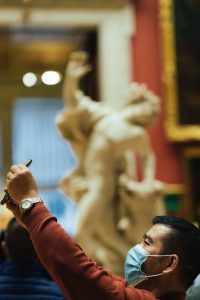 By Colorado Review Associate Editor Esther Hayes
By Colorado Review Associate Editor Esther Hayes
In the last few weeks, I have seen many posts online saying things like “Imagine all the great music and films and books that will come out of this quarantine!” And while I certainly understand that impulse—it is an impulse to shine a light of positivity through the very frightening and dark time we are living through, because we, as a society, are suffering, and we lean on the arts to bring us joy in dark times. But sometimes when we are in pain it is hard to imagine that those we rely on may also be struggling. And artists are struggling; I have received desperate pleas from artistic entities ranging from literary magazines crippled by AWP’s low attendance, to my local independent movie theater, to the Metropolitan Opera. To suggest that at the end of this global pandemic, there will be an absolute plethora of wonderful art to sink our teeth into is to suggest that musicians with canceled tours, actors and dancers without performances, cinematographers and screenwriters without television production and film shoots, writers without sales from local bookstores or canceled book tours and launches—that is, artists who have lost the already flimsy infrastructure upon which living as an artist is built—should pull it together and produce great work. Because tragedy makes great art, doesn’t it?
On the best days, artists are already working in extreme conditions: music, art, and theater programs are often the first things cut from school; higher education in the arts is prohibitively expensive; making art often requires a freelance lifestyle, working paycheck to paycheck without any benefits or financial security; striving to be a poet or musician or painter or actor is often a goal considered flippant and unrealistic by well-meaning friends and family members. Because while our culture consumes art voraciously, we do not value artists. Or perhaps we have a hard time connecting the artist with the art, because we have never been asked to. We are not asked to value and consider and support the early struggles and efforts of a young touring theater actor making fifty dollars a week until he becomes America’s Dad, or the penniless single mother who survived on welfare because she believed in a boy named Harry Potter.
Artists do not create to make money. If that is their initial assumption, they quickly learn how misguided that is. Artists do not create to be famous—how many of us have watched and loved and turned to Tiger King? Yet how many of us can name the director, cinematographer, editors, producers? Artists make because we know that the ability to connect with other humans through art is a worthwhile goal. We know that there will likely be no money or fame. We know that we will have to get used to the expressions that strangers make when we say, “I’m a poet.” And yet in the face of all of this disregard, all of this suffering, artists still create. Because we believe in the power of that creation.
Asking or assuming that when we come out the other side of this global pandemic that amazing new music, stories, films, ballets will be waiting for us is a facet of the same disregard for the process of making art that we have imposed upon creatives for a long time, only this time it is under the guise of optimism, the guise of picking back up and starting over.
If you have the itch to create, by all means do—we support you, we care about your well-being, and we can’t wait to read, watch, see what you built out of this unprecedented situation. But if this is all too much, if you think it is absurd to be asked to write the next great American novel while you are worried about how you will feed your family, if you are starting to maybe hate Shakespeare a little upon the umpteenth time reading about his productivity, that is okay. It is not you, the artist, who is failing. The failure resides with a society that believes that work should come easier, should flow more naturally in the face of tragedy. The failure resides in a society that takes for granted the selfless and incredible drive of those that believe in the power of human connection through creation. Maybe instead of imagining all that could come out of this confinement and suffering, we should be imagining the kind of art that could be created out of support and respect.
